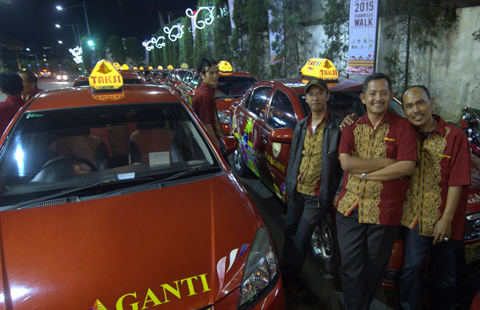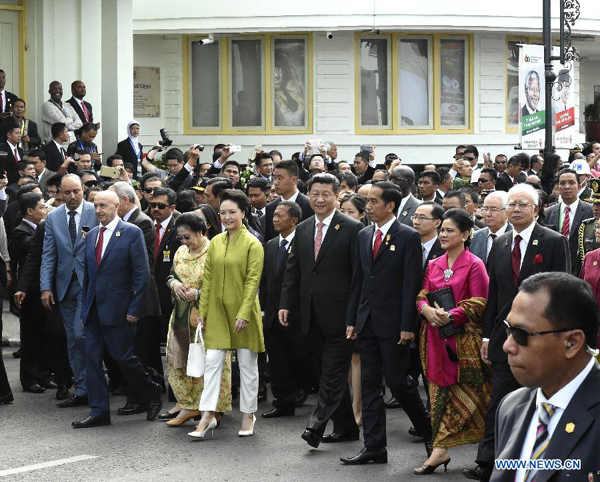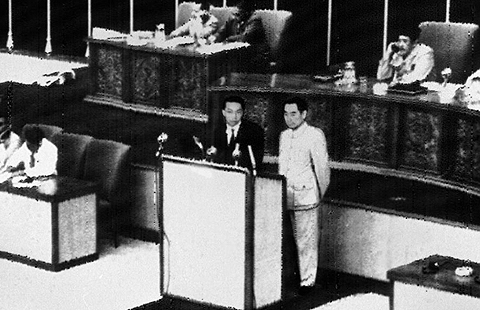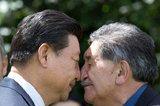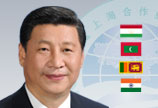Historic Bandung Spirit inspires modern Asia-Africa co-op
Updated: 2015-04-24 14:29
(Xinhua)
Comments Print Mail Large Medium Small
BANDUNG, Indonesia - Shoulder to shoulder and step by step, a dedicated team of Asian and African leaders literally followed the trail of their iconic predecessors on Friday with a highly symbolic stroll in this Indonesian city of legacy.
With the "historic walk" from Savoy Homann Hotel to Gedung Merdeka, or the Independence Building, the constellation sent out a clear message: They also see eye to eye and agree heart to heart on carrying forward the time-honored Bandung Spirit and further boosting Asia-Africa cooperation.
Sixty years after the landmark 1955 Bandung Conference, the two continents and the entire world have grown into "a closely intertwined community of common destiny," Chinese President Xi Jinping, who took part in the commemorative event, pointed out in a speech Wednesday at an Asia-Africa summit in Jakarta.
Under the new circumstances, the Bandung Spirit of solidarity, friendship and cooperation remains relevant and potent, Xi said, suggesting that the two vibrant continents continue their time-tested partnership in order to build a more equitable and reasonable international order for the benefit of their own people and those well beyond.
FROM PEACEFUL COEXISTENCE TO COMMON DESTINY
"The Chinese Delegation has come here to seek unity and not to quarrel, ... to seek common ground and not to create divergences," then Chinese Premier Zhou Enlai said at the Bandung Conference, the first large-scale Asia-Africa conference.
The emphatic remarks by the charismatic Chinese leader gave away the enormous ideological, historical and other differences between the more than two dozen participating nations.
Yet the straightforward statement also embodied the pragmatism of the Chinese mission, which worked flexibly with its counterparts to unite those disparate nations around their largest common denominator -- their aspiration for national independence and peaceful coexistence.
Upholding the Bandung Spirit, those mostly newly independent countries, a major part of what was later known as the Third World, choose a third path besides the Soviet and US orbits and converged to become a political force to be reckoned with on the world stage.
Sixty years later, the international landscape has undergone profound changes, yet the Bandung Principles remain the cornerstone of international relations, and the Asia-Africa bond has never weakened, said Li Renliang, a professor at Thailand's National Institute of Development Administration.
Indeed, in the increasingly globalized modern world, the interests of the two and also all other continents have become inseparably intertwined and their futures closely interlinked in a community of common destiny for all mankind that is coming into shape.
Take China as an example. The Asian giant is now Africa's largest trading partner, and has contributed one fifth of the continent's economic growth, according to the International Monetary Fund.
For the Association of Southeast Asian Nations (ASEAN), China is not only its largest trading partner but also the largest importer of its products, and the two sides are looking to upgrade their free trade deal this year.
In the new era, the Chinese president proposed in his Wednesday speech, Asian and African nations should continue to be good friends, good partners and good brothers that always stands together in weal and woe and in thick and thin.
Related Stories
Chinese ambassador calls for reinvigorating Bandung Spirit 2015-04-23 17:32
Xi raises three-point proposal on carrying forward Bandung Spirit 2015-04-22 21:11
60 years on, Bandung Spirit remains relevant 2015-04-22 10:53
Commentary: Bandung Spirit still relevant in today's world 2015-04-21 11:15
Schedule
Chinese President Xi Jinping will visit Pakistan and attend the Asian-African Summit and activities commemorating the 60th anniversary of the Bandung Conference in Indonesia from April 20 to 24.
April 22
Attend the opening ceremony of the Asian-African Summit;
Meeting with Indonesian President Joko Widodo;
April 23
Bilateral meetings;
Attend the closing ceremony of the Asian-African Summit;
April 24
Historical walk from Savoy Homann Hotel to Gedung Merdeka;
Attend activities commemorating the 60th anniversary of the Bandung Conference;
Feature
